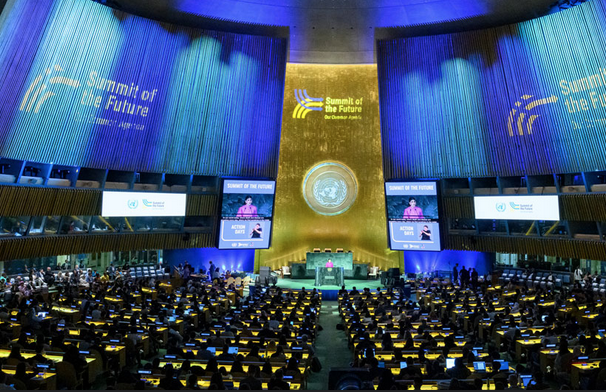UN Summit Concludes with Agreement to Disagree on Everything and Call It Diplomacy
Did they really come up with a solution? Find Out
NEWS
The Audacity
9/19/20252 min read


NEW YORK — After three days of intense deliberations, heated debates, and approximately 47 interpretive dance presentations, the United Nations General Assembly has reached a historic breakthrough: member nations now unanimously agree to disagree on everything and officially label it diplomacy.
“This is a landmark achievement,” declared Secretary-General António Guterres, while smiling ambiguously. “Never before in history have we found such unity in disagreement. It’s truly inspiring.”
The Summit: A Parade of Polite Contradictions
Delegates from 193 countries attended the summit, which was initially called to address global crises including climate change, economic inequality, and the proliferation of cat videos on social media. Instead, the agenda evolved into a sophisticated ballet of mutual contradiction.
Highlights include:
Climate Change Debate: The U.S. proposed “a moderate approach,” France insisted on “radical urgency,” and Brazil offered a compromise: “Let’s plant trees… somewhere.”
Economic Policy: Germany advocated fiscal responsibility, while Italy suggested pizza subsidies as a solution. Consensus? “We all have budgets and also love pizza.”
Social Media Regulations: China pushed for strict censorship, while Sweden emphasized free expression. Outcome? “Let’s agree that both ideas are valid.”
By the third day, delegates reportedly began applauding each other’s disagreements, viewing it as the highest form of international cooperation.
Diplomacy, Redefined
According to experts, this new strategy represents a radical shift in global politics:
Old Diplomacy: Nations negotiate, compromise, and occasionally threaten each other with war.
New Diplomacy: Nations politely state irreconcilable positions, nod sagely, and call it “progress.”
Dr. Harold Jenkins, a political analyst at the University of Chicago, explained: “It’s brilliant in its simplicity. Nobody gets upset, nobody changes policy, and everyone leaves feeling important. It’s a win-win… for egos.”
Public and Media Reaction
Reactions to the summit’s results have ranged from awe to bewilderment.
New York Times headline: “UN Reaches Consensus on Consensus: Disagreement Now Officially a Diplomatic Tool”
Twitter user @GlobalGrapes: “Just read the UN press release. So… they didn’t solve anything? Cool, same energy.”
Local protester: “I was hoping for action on climate change, but I guess polite disagreement counts as progress. I’m taking notes.”
Meanwhile, stock markets responded predictably: confusion. Analysts were unsure whether to buy, sell, or simply shrug.
Next Steps: More Meetings About Meetings
The UN has scheduled follow-up sessions to discuss implementation of the “agree to disagree” framework. These meetings will involve:
Reviewing each country’s disagreements.
Documenting them in a 600-page report.
Hosting a ceremonial dinner where delegates can silently glare at one another.
Officials say this process could take years, but they remain optimistic. “Rome wasn’t built in a day,” said Guterres, “and neither is global inaction.”
A Landmark Achievement in Human History
In a closing statement, the Secretary-General summarized the summit’s success:
“Today, we have collectively achieved what many thought impossible: 193 nations disagreeing on every topic, yet walking away proud, dignified, and convinced they have advanced humanity.”
As delegates boarded their planes, each country returned home with a newfound sense of purpose: to continue doing nothing about global crises while feeling absolutely justified.
And in that sense, the UN’s historic achievement may be the most diplomatic agreement on inaction the world has ever seen.
Nonsense
Join us for absurd headlines and laughs.
© 2025. All rights reserved.